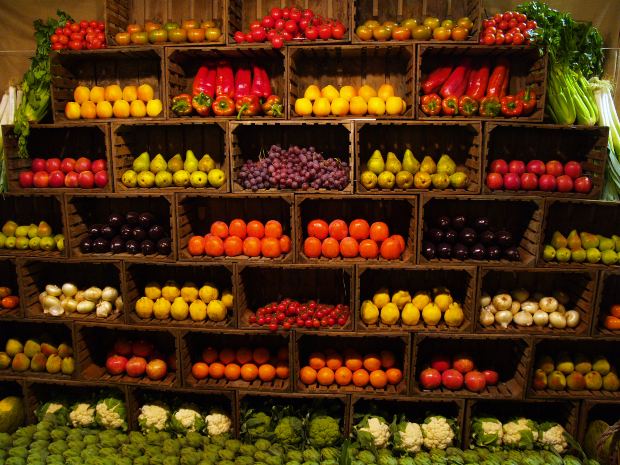15 Healthiest Frozen Fruits and Vegetables: Get Leaner and Save Money, Too!
5 min read
Life The Green Way –
What if I told you that you could be more fit, boost your antioxidant intake, and save money — all at the same time? Sounds too good to be true, right? Well, I've put together a list of 15 frozen fruits and vegetables – yes, frozen – that will help you do just that!
Especially during the winter months, fresh produce is limited – or expensive – in most of the country, which forces many of us to turn to either canned or frozen fruits and veggies. While canned vegetables tend to lose a lot of nutrients during the preservation process (some notable exceptions are tomatoes and pumpkin), frozen vegetables may be even more healthy than some of the fresh produce sold in supermarkets.
The U.S. Food and Drug Administration (FDA) and the International Food Information Council (IFIC) both agree that nutrients in produce are generally NOT lost during freezing and they provide the same essential nutrients and health benefits as fresh fruits and vegetables.
Once a fruit or vegetable is picked, it starts to lose nutrients, so exactly when it's plucked, and how long after harvesting you eat it, impacts its nutritional value. Did you know that fresh produce can lose as much as 45{533314f2540bdd33bbc04377fd32ff805adcd56cc20929d47e9b088aa1bb02ce} of its essential nutrients from the time it leaves the farm to the time it makes it to your table — a period that can last as long as 16 days? These berries, melons, greens, etc., are often exposed to pesticides, extreme heat, and light during transport, which further decreases their freshness and nutritional value.
On the other hand, most frozen fruits and vegetables are quickly blanched, boiled, or steamed, and then frozen within a few hours of being picked, a process that helps lock in both fresh taste and nutritional value. Since the freezing process actually preserves food, no unwanted additives (e.g. no added salt or sugar) are needed in bags of frozen pineapples or broccoli, for examples. Therefore, it's pretty easy to find fruits and veggies with single word ingredient lists– just the fruit or veggie itself. To be sure, always check the ingredients, but I bet you'll find at least a 10 varieties in the freezer aisle with absolutely nothing added – definitely a win-win!
Also, you'll want to be sure to choose packages marked with a USDA “U.S. Fancy” shield, which designates produce of the best size, shape and color. These vegetables tend to be more nutrient-rich than the lower grades (“U.S. No. 1” or “U.S. No. 2.”). Also, try not to wait too long to eat them after purchasing: over many months, nutrients in frozen vegetables do decrease. Steam (don't microwave) rather than boil your produce so that you can retain as much of the water-soluble vitamins as you can.
Try Any or All of These 15 Healthy Frozen Fruits and Vegetables:
1) Cherries. Research links cherries' red color—provided by the fruit's powerful anthocyanins—to a reduction in inflammation, total cholesterol, and belly fat. Cherries are also rich in two important flavonoids, isoqueritrin and queritrin, which act as antioxidants and work to eliminate byproducts of oxidative stress, therefore slowing down the aging process. You can add frozen cherries to your smoothies or defrost a cup and put them on top of plain Greek yogurt.
2) Blueberries are packed with vitamins C, E, riboflavin, niacin, and folate. One cup of blueberries has only 71 calories, but packs 6 grams of fiber, and it's hard to believe just how much nutrition is jammed into such a small superfruit.
Catechins found in blueberries activate fat-burning genes in abdominal fat cells to assist with weight loss, and belly fat loss in particular. According to research at Tufts University, regularly ingesting catechins increases abdominal fat loss by 77 percent and double total weight loss.
Additionally, blueberries are one of the richest sources of proanthocyanidins, which are phytonutrients that decrease free radical levels that are linked to aging (say goodbye to wrinkles!) and disease.
Keep these berries on hand to boost the flavor and nutrients in your protein shakes, or add frozen blueberries to hot cereal.
3) Peaches are the perfect snack food for losing weight. A peach makes you feel full and keeps you from overeating. One medium peach contains only 35-50 calories and zero fat!
These fruits are high in calcium, potassium, B vitamins, and antioxidants. They also help keep the skin healthy. Vitamin A and C make peaches a great natural moisturizer which is why they’re often used in cosmetics. These vitamins can help regenerate skin tissue.
For a healthy dessert, bake one peach with cinnamon and a touch of agave, then top with low-fat frozen yogurt. Yummy!
4) Broccoli reportedly helps lower cholesterol and detoxifies the body. Steamed broccoli is full of potassium and folate – which helps prevent anemia – and it also gives you solid doses of vitamins A, C, and B6.
It’s also a huge cancer-fighter. Broccoli contains something called sulforaphane, which may help combat prostate, liver, lung, bladder, skin, and stomach cancer. Plus it’s rich in compounds that boost healthy tumor suppressors—and destroy ineffective ones.
Broccoli is great fuel, because with 5 grams of fiber per cup, it helps you fill up fast. And…it’s only about 55 calories per cup. Add some to your omelet to make it even more delicious.
5) Green Beans are rich in eye-protecting phytonutrients and manganese. Aside from relieving symptoms of osteoporosis and osteoarthritis, manganese can also help fight premenstrual syndrome (PMS). A healthy dose of manganese can help alleviate PMS symptoms such as irritability and mood swings. Manganese also helps your body to effectively absorb other nutrients such as vitamins B, E and the mineral magnesium.
Another good reason to eat green beans is that they are packed with vitamin A. Vitamin A is a powerful antioxidant that can help protect you against cancer, heart disease and high blood cholesterol. Vitamin A is also known for eliminating signs of skin aging, such as wrinkles, fine lines, dull skin and age spots.
Read more »
(c) Life The Green Way – Read entire story here.











